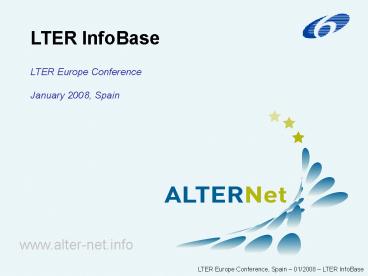LTER InfoBase PowerPoint PPT Presentation
1 / 21
Title: LTER InfoBase
1
LTER InfoBase LTER Europe Conference January
2008, Spain
2
LTER InfoBase the reasons behind a complex
process Johannes Peterseil (UBA) johannes.peter
seil_at_umweltbundesamt.at
3
Aim of the session
- LTER InfoBase the reason behind
- Process so far
- Next steps
- discuss the concept
- Metadata collection
4
LTER InfoBase the reason
- Data is the currency of science
- Metainformation is needed on the question what
is where - There always exist different level of available
information on sites/platforms
5
LTER InfoBase the reason
- Why a next attempt?
- To provide a framework
- which allows you to integrate information on
different levels - which can be extended if new information is
available (e.g. new research projects, sites,
platforms, )
6
LTER InfoBase the reason
- Provide a toolkit to fulfil this requirements
- structure information
- access information
7
LTER InfoBase the steps
- Development of a data structure which allow to
integrate metadata of different sites and
platforms - Design of a questionnaire to collect the
information wanted - Presentation of the data collected
8
Goal of the questionnaire
- to gather information for the LTER InfoBase
- to develop a standardized and common usable
questionnaire for LTER networks
9
Goal of the questionnaire
- to provide an input for the development of domain
ontologies within the WP I6 - to provide a basis for a discussion regarding the
definition of minimum criteria for the selection
of LTSER sites
10
The team
- Peterseil, Johannes
- Magagna, Barbara
- Schentz, Herbert
- Ayromlou, Minu
- van der Werf, Bert
- Adamescu, Mihai
- Cazacu, Constantin
- Dactu, Sabina
- Frenzel, Mark
- Kertész, Miki
- van Daele, Toon
- Bertrand, Nic
- Borovec, Jakub
- Karasti, Helena
- Lieskovský, Juraj
- Neuner, Angelika
- contributors within the ALTER-Net network
11
The interviews
- Check the existing information
- Update the information
- Complete the information
- Add information about the entities observed
12
The Experimental Unit
Conceptual model for identification of woodland
and forest ecosystems
Ecosystem scale
Conceptual model for identification of aquatic
ecosystems (modified after Vadineanu, 2001)
Ecosystem types Grassland, Heathland and scrub,
Wetlands, Constructed Systems , Sparsely
vegetated or un-vegetated ecosystems,
Agricultural Ecosystems, Forest Ecosystems,
Marine Ecosystems, Coastal Ecosystems.
13
Hierarchical approach
LTER InfoBase - approach
- LTSER / LTER Site
- General info
landscape level
Ecosystem level
- Compartment level/group level
- with the corresponding (describing) parameters
14
LTER InfoBase - structure
15
LTER InfoBase - structure
Identification Name, etc. Structure simple
site, complex of ecosystems/ platform Location
coordinates of the central point, map of the LTER
site (LTSER site) Administration funding,
management, public relation, institutional
framework, etc. Networks / Projects Research
questions Research activities and
infrastructures Etc. Information blocks are
extendable according to the user needs!
16
(No Transcript)
17
(No Transcript)
18
(No Transcript)
19
(No Transcript)
20
(No Transcript)
21
Data presentation
- https//secure.umweltbundesamt.at/eMORIS/
- User sise
- Password sise

